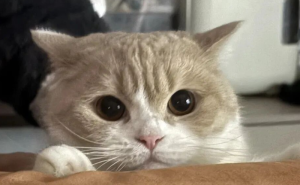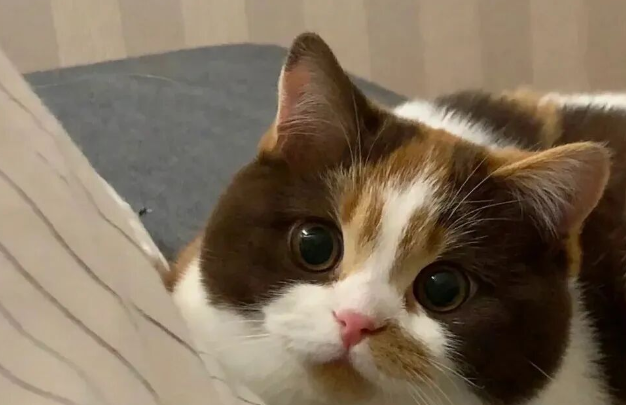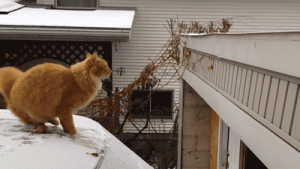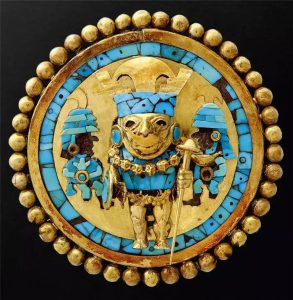Every cat owner has probably experienced this magical moment: you’re just waking up from a deep sleep, still groggy and half-awake, and you notice your cat sitting right at the edge of the bed, staring straight at you.But how exactly do cats know so precisely when their humans wake up? Today, let’s dive into the surprising secrets behind this fascinating feline behavior.
-
Cats’ Top-Tier Hearing System
Anyone who has lived with a cat knows this: the moment you turn over in bed, your feline jumps up immediately. This isn’t a coincidence. Cats’ hearing is truly biological high-tech.Their ears can rotate 270 degrees like radar, detecting the slightest changes in your breathing—changes that humans can’t even notice.Cat owner @MilkCandy shared an experiment with her calico: while in deep sleep, her breathing was 12 breaths per minute, but just before waking, it suddenly sped up to 18. At that precise moment, her cat would gently tap her cheek with its paw, with a timing accuracy of no more than 30 seconds.
-
Cats’ Precise Biological Clock
Cats’ ability to keep track of time is astonishing.Shanghai cat owner @MeowTalk wakes up at 7:15 a.m. every day, and her British Shorthair reliably sits on the nightstand at 7:10 a.m.. Once, she pretended to sleep until 7:30 a.m., and her cat checked in every five minutes by swiping her foot with its tail—like a little living alarm clock.Animal behaviorists note that cats can build precise time awareness through cues like light changes and environmental sounds. This ability comes from their wild ancestors, who needed to anticipate prey activity patterns for survival.
-
Cats’ Super Sense of Smell
In the morning, the human body secretes cortisol to help wake up. These subtle hormonal changes do not escape a cat’s olfactory radar.In an American lab study, cats could detect changes in human sweat at concentrations as low as 0.01 ppm.Online user @MeowObserver shared: whenever she approached the end of deep REM sleep and began to sweat slightly, her Maine Coon would sit by the pillow ten minutes in advance, anticipating her waking.

-
Cats Are Microexpression Masters
Think pretending to sleep will fool your cat? Think again!Cats can detect tiny movements like flickering eyelashes or the rolling of the Adam’s apple. A Japanese cat café ran a fun experiment: volunteers kept their eyes closed and only slightly curled their fingers.The result? 83% of the cats correctly detected “fake sleep”, and one calico cat even pounced the instant the volunteer’s eyes moved. This skill originates from hunting, where cats learn to detect prey pretending to be dead.
-
Cats and Owners: A Mutual Morning Ritual
Chongqing stray cat rescuer Lao Zhang made a heartwarming observation: a disabled tabby he rescued would tap his face with its missing front paw every morning to wake him up.Animal psychologists explain this as a form of “morning confirmation”. When cats consider humans part of their family, they show a strong desire to check in each morning.Much like wild cat colonies groom each other to confirm survival, domestic cats use face rubbing and kneading to say:“Human, it’s a new day—don’t forget to love me!”
What kind of exclusive wake-up service does your “cat alarm clock” offer? Is it a full-on kneading attack, or a gentle morning meow broadcast?We’d love to hear your stories! Share your morning adventures with your furry friend in the comments below~





